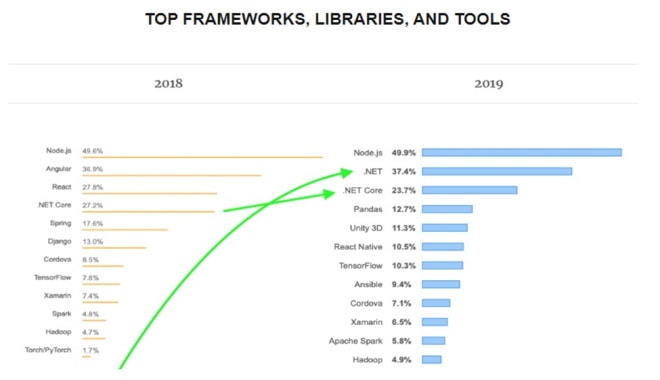The constantly widening tech ecosystem has continued to spawn new job opportunities for IT professionals. And with the emergence of new tools and technologies, the demand for tech professionals is projected to continue rising for the foreseeable future. As a dot net developer, this is an exciting time as the demand for these skills continues to be the most sought after within the programming arena.
With that said, just like any other profession, the dot net market is a broadening field with a wide range of associated or specialized skills, making it super-competitive. So, what does it mean for aspiring dot net developer who is keen to make a career out of this field?
In this article, we are going to look at the role of .NET developers, the current labor market, and why companies are finding it difficult to find the right candidates.
What is .NET?
.Net framework is a software development platform that is widely used to create Form-based apps and Web-based apps, as well as build Web services. On top of supporting various programming languages like Visual Basic and C#, .NET Framework Programming also allows developers to easily build projects without having to reinvent the wheel thanks to the code-sharing capability.

This open-source nature of dot net saw the framework voted as one of the top frameworks in 2019 according to a survey report by Stack Overflow, edging out its peers like Pandas, Unity 3D, and React Native. In terms of use, a report by Similar Tech estimates that the number of websites developed using .NET to be 2,347,702, while a different report by BuiltWith Statistics indicates that more than 37.5 million live websites are currently using ASP.NET framework.
The Role of a .Net Developer
The role of a dot net developer is asymmetric and multidisciplinary. For starters, they are largely tasked with designing, corresponding implementation, and developing software based on various technologies. Along with that, they also help analyze specific problems and develop appropriate system requirements to be implemented in the app’s interfaces and components.
Lastly, dot net engineers can also help in the management of software projects by taking one simple task such as bug fixing to the complex ones like integrating your app with other business processes
Necessary Skills Set for a Dot Net Developer
As an enterprise looking to hire a full-stack dot net developer, here are some of the soft and technical skills to look out for:
- Hands-on experience in handling code structures and system design.
- Experience with at least C# (“C sharp”), VB.NET, and F# (“F sharp”).
- ASP.NET MVC for purposes of building fast and secure web applications.
- Client-side technologies like HTML, CSS, and JavaScript.
- Job-specific databases such as SQL Server and Oracle.
- .NET developers have theoretical-abstract knowledge, commercial-organizational activities, and organizational-testing.
Read More: Security Tips for App Developers to Protect User Data
Why Is It Difficult for Companies to Hire Dot Net Developers?
Businesses have never embarked on a massive recruitment exercise to fill vacant .NET positions as they do today, never spent as much time and money doing it, and never done worse a job of it.
Below, we have attempted to explain why companies find it hard to recruit .NET developers besides the demand-exceeds-supply argument.
Top Talent Gets Hired Faster
Hiring managers across the world agree that top talent gets hired faster. According to a recent report by Fast company, the more steps there are in a recruitment process, the lesser the likelihood to hire talent.

Better yet, when it comes to hiring top-notch developers, hiring speed becomes even more critical. For instance, 83% of developers will accept job offers if it is made within 21 days after which the percentage drops down to 63%.
To avoid falling into this trap, hiring managers need to proactive in identifying the right candidates as quickly as possible by deploying a multi-pronged approach by fast-tracking and conducting interviewing over Skype and using temp-to-perm hiring strategies.
The Compensation Race
Another reason why companies find it hard to hire dot net developers are the high salaries. Due to skills demand outstripping supply, salaries in the entire tech ecosystem have immensely grown, spawning the compensation race.
And while this may sound like a good idea for programmers, for small startups, it cuts either way. To attract qualified developers, they need to pay a higher .Net Developers salary, while the upward trend in salary growth means that large corporations with the financial capability have an upper hand.
For this reason, small companies running under tight budgets have to operate under the mercy of labor market forces or simply make salary offers that are too good to refuse-which rarely happens.
Unrealistic Expectations
When it comes to looking for .NET developers, most employers tend to look for “purple squirrels.” by listing unrealistic technical abilities and skill requirements in their job descriptions. Some want C#, .NET, and SQL on top, while requiring strong communication skills and proactive thinking to support their Agile development environment. As if this wasn’t bad enough, some hiring managers want to sneak in other requirements like IoT, big data and Angular.
Realistically, finding someone who knows everything about .NET as well as possesses all these supplemental skills is almost impossible. Instead of holding out for a utopical job candidate, you need to hire a promising candidate and then walk with them through their professional development as they grow to become the employee you envision.
Read More: How to hire good offshore software developers?
Geographical Imbalances
Companies may also find it difficult to find the right dot net candidates depending on their location. This is because there are geographical areas that are more technologically advanced than others, and unless developers willingly pack up and move to the areas with sparse skills, companies have to just suck it up and open offices in the areas.
With that said, the growth of outsourcing and freelancing has quickly become an excellent solution for companies looking for new IT solutions but have limited in-house skills.
Which brings us to the question, how do in-house .NET developers compare with freelance developers in terms of salary earnings?
In-House .Net Developer vs Freelance Dot Net Developer: Who Earns the Highest?
Although there are many ways to approach the hiring subject- full time vs freelance-, we will purely focus on costs.
But first, it’s common knowledge that programmers with more years of experience tend to earn more, whether they are working full-time or as freelancers.
That aside, when it comes to full-time developers, these are individuals who devote more than 40 hours per week and their salary amount is mainly calculated on an annual basis. In the US, for example, a full-time.NET developer earns an average annual salary of $68,524, while in the UK, the same position commands £48,898/yr. In France, a .NET developer with over 4 years experience is able to command an annual salary of between $54K and $59K., while a senior .NET developer in Ukraine with over 5 years of experience earns $42K annually. On the other hand, the cost of hiring freelance developers significantly varies depending on regions and countries. For instance, the average hourly salary in North America is anything between $50 to $250. In Eastern Europe and India, the takes a nosedive to clock between $25 and $75.

At face value comparison, freelancers may appear to have an absolute win over full-time and dedicated developers. However, your hiring model should be ultimately dictated by your company’s vision, the task at hand, and budget estimates.
What Does The Future Hold For .Net Developers?
The future of .NET is both exciting and promising. At Microsoft’s Build 2019, the company announced it was introducing the next-gen .NET 5 framework version that would incorporate a host of new libraries and tools to make the lives of developers easier.
For instance, aspiring developers won’t have to learn JavaScript for SPA frameworks since Blazor will handle this aspect. Similarly, learning Python for ML applications will cease to exist because the new ML.is there to support it.
So, if you are an aspiring .NET developer or already an insider, you can go in full throttle expecting that these improvements will see more and more companies gravitating towards .Net. As a result, job opportunities will not only see a rising trend in the short-run but also in the coming years.
Final Thoughts
In previous years, Microsoft was accused of aggressive business tactics and a closed ecosystem, all of which we centered around preserving the dominance of their desktop operating system.
However, in spite of the past terrible track record, the company seems to have changed tact and dominance seems to be the least of their worries. As a result, the .NET code is open-source and they actually transformed it into a cross-platform, allowing it to accommodate other programming languages, such as Javascript and Python.
Today, .NET is permanently entrenched in the technology world “pop-culture” and is hailed as one of the best platforms to build desktop and web-based applications. With such an impressive portfolio, we are yet to see the tricks that .NET has got hidden up its sleeves.



